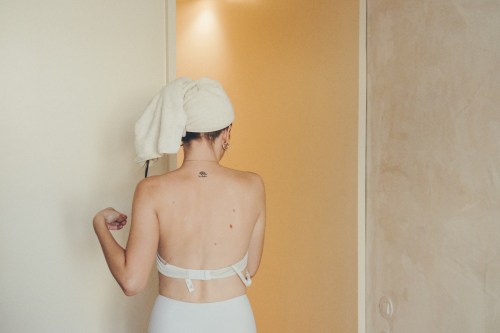I still remember my very first visit to the gynecologist in high school. Right above the pamphlets about sexually transmitted infections and birth control was a poster showing how to perform a breast self-exam. During the appointment, my gynecologist walked me through how to do it, feeling for lumps, dimpling, or swelling.
Experts in This Article
Deborah Lindner, MD is an OB/GYN and the chief medical officer at Bright Pink, a national non-profit organization dedicated to the education, support and early detection of ovarian and breast cancer awareness. She is a staff physician at Midwest Vein Center in Chicago where her clinical focus is treating varicose veins during and after pregnancy.
It certainly wasn’t the last time a gynecologist brought up breast self-exams during an appointment. Even at my most recent appointment, my OB/GYN asked me if I was performing breast self-exams at home regularly. I was honest when I told her no; the only time I gave my breasts any real attention was to pluck a stubborn nipple hair. To me, breast self-exams were on the list of wellness habits I “should” do, but…don’t.
But recently, I learned that the American Cancer Society (ACS) no longer recommends breast self-exams, and haven’t since 2015. So why do many OB/GYNs still bring them up? I reached out to Deborah Lindner, MD, the chief medical officer for Bright Pink, a national non-profit organization dedicated to the education, support and early detection of ovarian and breast cancer awareness, to find out out more.
Why the ACS no longer recommends breast self-exams
Breast self-exams have long been framed as a “life-saving habit” that would help people easily detect changes in their breasts that could potentially be cancerous. But research doesn’t support those claims, says Dr. Lindner—which is why the ACS changed their recommendations in 2015. (Other groups like the Centers for Disease Control and Prevention (CDC), followed suit in their own recommendations.) “Breast self-exams have never been shown to decrease the mortality of breast cancer,” Dr. Lindner says. “[This means] people die of breast cancer at the same rate whether they do breast self-exams and mammograms, or just skip the self-exam and do mammograms as recommended.”
According to Dr. Lindner, breast self-exams can also cause a lot of unnecessary anxiety. “Doing a monthly breast self-exam while thinking it is your responsibility to catch your own cancer [can] lead to increased anxiety, depression, and fear,” she says. Breast self-exams also increase the chance of finding a lump that isn’t cancer, she adds, which can then lead to going through unnecessary testing, biopsies, and surgery—all of which are expensive and can add extra stress.
She adds that breast self-exams can be particularly inefficient for people with dense breasts—which is a problem, given that people with dense breasts are more likely to get breast cancer. (Per the CDC, 50 percent of women fall into the “evenly dense” or “extremely dense” breast category.) “Dense breasts, as well as fibrocystic breasts, are very difficult to examine, both for a patient and a physician,” she says, because dense tissue can make it harder to identify cancerous lumps by touch. “Imaging with 3D mammogram is better at determining whether something is concerning, so a mammogram needs to be the screening test that is done. If a woman does notice a change or something concerning, it is the imaging, not the exam, that will determine whether a biopsy is necessary.”
What about the clinical breast exams that are often part of an OB/GYN exam? Dr. Lindner says that there is no concrete evidence supporting that these exams are either helpful or harmful so it’s hard to advocate for or against them. But in her experience, she has found them to serve an important purpose. “I can tell you that I have found several breast cancers during physical exams, and have had many patients ask if I could feel something they had felt themselves and either reassured them or told them it was concerning and needed additional imaging,” she says. “Ultimately it’s the patient’s decision whether they would like to have their OB/GYN do this exam, so if it makes them more comfortable to be checked, they can ask for the exam, but if it makes them uncomfortable, they can opt out.” She also adds that someone with a family history of breast cancer or with other risk factors may benefit from it more than others.
Does this mean I never have to do breast self-exams ever again?
None of this is to say that breast self-exams are bad or harmful; they’re just not a monthly requirement like they used to be. “The new recommendation is to practice breast self-awareness, which means knowing what your normal breasts look and feel like, knowing your family history and personal risk of breast cancer, knowing how you would find a cancer —when to worry about something you feel, and when you should be doing a mammogram to look for abnormalities, based on your own personal risk—and how to live a healthy lifestyle that will reduce the risk of getting cancer,” Dr. Lindner says.
Dr. Lindner says that breast self-exams can be helpful in this context because they serve as a way to familiarize yourself with your own breasts; a way to notice what’s “normal” for you. This can make being aware of any changes easier.
Okay, so what is the most effective way to detect breast cancer?
While breast self-exams aren’t all that effective at detecting breast cancer and preventing breast cancer-related deaths, there is something that is: mammograms. When and how often to get a mammogram depends on someone’s risk level for breast cancer, says Dr. Lindner. Someone with the BRCA1 or BCRA2 gene mutation, she says, can start getting mammograms with MRIs starting at age 30. “If someone has no gene mutation, but does have a family history of breast cancer, mammograms should start at 40, or 10 years earlier than the relative who had cancer,” she says.
Don’t have any risk factors? According to the ACS, mammograms should be done every year between the ages of 45 and 54, and every two years for people 55 and older.
“What’s most important is knowing your risk factors so that you can determine with your health-care provider how to best screen for and reduce your risk of getting cancer,” Dr. Lindner says. To her point, mammograms save lives. So while you may or may not perform breast self-exams, that’s one preventive measure that should not be skipped.
Oh hi! You look like someone who loves free workouts, discounts for cult-fave wellness brands, and exclusive Well+Good content. Sign up for Well+, our online community of wellness insiders, and unlock your rewards instantly.
Sign Up for Our Daily Newsletter
Get all the latest in wellness, trends, food, fitness, beauty, and more delivered right to your inbox.
Got it, you've been added to our email list.









